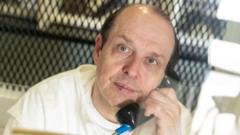Roberson, 57, was sentenced to death in 2003 for the murder of his two-year-old daughter, Nikki Curtis, after medical professionals concluded that she died from abuse-related injuries. Despite this, Roberson’s supporters, including a bipartisan group of Texas lawmakers and prominent figures such as author John Grisham, argue that the conviction was based on outdated science that fails to accurately reflect current understandings of "shaken baby syndrome." They maintain that the child’s death could be attributed to pneumonia complications, which Roberson has advocated vehemently.
Ahead of the scheduled execution, several lawmakers and advocates publicly called for clemency, suggesting that Roberson’s undiagnosed autism may have influenced the perception of his emotional response during the investigation. The Texas attorney general is appealing the restraining order, further complicating the situation.
In a poignant reflection, the lead detective in the case, Brian Wharton, expressed remorse over his role in Roberson's conviction, stating that he now believes an innocent man was sent to death row. A clemency petition submitted to Texas' Board of Pardon and Paroles was denied, but Roberson continues to appeal for mercy. With significant national scrutiny and calls for a reassessment of the judicial procedures surrounding capital punishment, Roberson's case remains a focal point of debate over legal and medical standards in the United States.
Ahead of the scheduled execution, several lawmakers and advocates publicly called for clemency, suggesting that Roberson’s undiagnosed autism may have influenced the perception of his emotional response during the investigation. The Texas attorney general is appealing the restraining order, further complicating the situation.
In a poignant reflection, the lead detective in the case, Brian Wharton, expressed remorse over his role in Roberson's conviction, stating that he now believes an innocent man was sent to death row. A clemency petition submitted to Texas' Board of Pardon and Paroles was denied, but Roberson continues to appeal for mercy. With significant national scrutiny and calls for a reassessment of the judicial procedures surrounding capital punishment, Roberson's case remains a focal point of debate over legal and medical standards in the United States.























